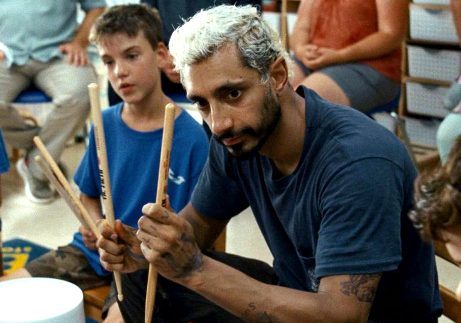 Riz Ahmed plays a rock drummer who loses his hearing and must come to terms with being a deaf person, in Darius Marder’s moving drama.
Riz Ahmed plays a rock drummer who loses his hearing and must come to terms with being a deaf person, in Darius Marder’s moving drama.
There have been times when I’ve avoided or delayed seeing a film because of an impression that I got from ads or previews. In the case of Sound of Metal, a recent film by Darius Marder, I somehow had the idea that it was the story of a heavy metal drummer trying to relearn how to play the drums after losing his hearing. It sounded kind of intriguing, but not enough to really grab me. Later, as I saw it rack up award nominations, and win a few, I decided to give it a try, especially since I’ve admired the past performances of the main actor, Riz Ahmed. Once again, as is often the case, I find that my preconceptions were wrong. Yes, Ahmed’s character Ruben Stone is a heavy metal drummer, and he does lose his hearing. But the drumming part is only incidental. The subject of the film is a man struggling to accept being a deaf person, and it is a very moving experience. Even the title has a somewhat different meaning than I thought, which I won’t give away.
We first meet Ruben drumming for his two-person band, which plays a form of underground death metal. They’re kind of like The White Stripes, but in reverse, with Ruben’s girlfriend Lou, played by Olivia Cooke, on guitar and vocals. They live and tour together in an Airstream camper, and are just starting to get better known in the metal world. But one morning after waking up, Ruben notices that sounds seem muffled. Attempts to unblock his ears accomplish nothing, and without telling Lou about his problem, he gets examined by an ear doctor who concludes that his hearing loss is progressive and permanent. The doctor mentions the possibility of cochlear implants, and Ruben latches on to this hope, even though the implants are very expensive. He tries to keep drumming in their concerts, but it becomes clear that there’s a big problem. Lou, with the help of Ruben’s sponsor (it turns out that he’s in recovery for drug addiction) finds a place for him to go to learn how to function as a deaf person, and after his initial rejection, insists that he go and that she will wait for him.
Ruben, with tattoos all over his body and several piercings, looks like a formidable tough guy. As Ahmed plays him, this is a carefully constructed protective shield for a core of anxiety and depression. After the rage and denial of his initial discovery, the big test comes when he goes to a home for the deaf: part of a rehab that also includes a school for deaf kids. Ahmed’s performance is awe-inspiring—we experience the full range of resistance and growth that Ruben gradually goes through, much of it communicated by his remarkably expressive eyes and body language.
The person who challenges him the most is the director of the rehab, a deaf recovering addict named Joe, played by Paul Raci, an actor who was himself raised by deaf parents and is fluent in sign language. His character, Joe, has a straightforward no-nonsense approach to Ruben. He needs to get past self-pity as quickly as possible so that he can learn the survival skills he needs. The film depicts a year or so of Ruben’s life in the rehab, his relationships with the other people there, and with the much younger kids in the classes he has to take, a process that is agonizing but ultimately amazing.
Marder’s assured direction opens up the deaf world to the audience’s understanding, powerfully and with great humor. Ahmed not only learned how to drum believably in the film, but learned American Sign Language, immersing himself in deaf culture for the role. With his character we take an incredible journey of pain and insight, and we learn some difficult lessons along with him. In Sound of Metal we witness the profound silence at the heart of things.

A 9-year-old girl is sent away from her abusive family to live with an older couple, who try to break through her fear and...

The Act of Killing, a documentary film by Joshua Oppenheimer, starts us out with some very minimal historical background. In 1965, the government of...

A witty English drama from John Schlesinger about an unusual triangle: a man and a woman both in love with the same man. John...